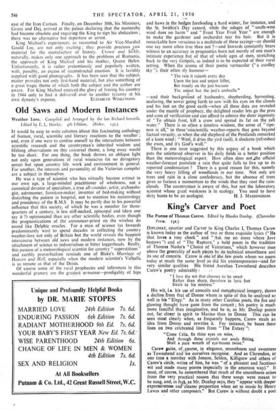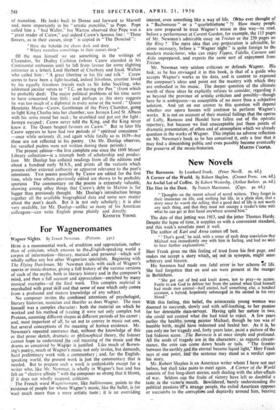King's Carver and Poet
DIPLOMAT, courtier and Carver to King Charles I, Thomas Carew is known today as the author of two or three exquisite lyrics (" He that loves a rosy cheek " and " Ask me no_ more where Jove liestows ") and of " The Rapture," a bold poem in the tradition of Thomas Nashe's " Choice of Valentines," which however rises above the generality of such pieces by its technical smoothness and its use of conceits. Carew is one of the few, poets whom we assess today at much the same, level as did his contemporaries—and for very similar qualities His friend Aurelian Townshend describes Carew's poetry admirably : .1 • , .
" I love the wit that chooses to be sweet
Rather than sharp, therefore in lyric feet Steals to his mistress."
His wit, i.e. his use of conceits and metaphysical imagery, shows a decline from that of Donne whom in spite of this he analysed so well in his " Elegy." As in many other Caroline poets, the fire and glowing thought have gone from the conceit ; his poetry is much more fanciful than imaginative, and he is, as Mr. Dunlap points out, far closer in spirit to Marino than to Donne This can be seen most clearly when, as frequently happens, Carew steals an idea from Donne and rewrites it. For instance, he bases these lines on two celebrated lines from " The Extasy ":
"Come Celia, fix thine eyes on mine,
And through these crystals our souls flitting, Shall a pure wreath of eye-beami twine."
Carew gains, of,ipurse, in elegance, smoothness and sweetness as Townshend and 'we ourselves recognise. And as Clarendon, at one time a member with Jonson, Selden, Killigrew and others of Carew's circle, writes of him, he was " of a pleasant and facetious wit and made many poems (especially in the amorous way)." It must, of course, be remembered that much of the smoothness arises from the very practical reason that these songs were meant to be suing, and, in fact as Mr. Dunlap says, they " appear with deeper expressiveness ate clearer proportion when set to music by Henry Lawes and other composers." But Carew is without doubt a poet
of transition. He looks back to Donne and forward to Marvell and, more importantly in his " artistic punctilio," to Pope. Pope called him a " bad Waller," but Warton observed that Pope was a " great reader of Carew," and indeed Carew's famous line : " These flowers, as in their causes, sleep " is copied in " The Dunciad ": " Here she beholds the chaos dark and deep " Where nameless somethings in their causes sleep."
Of the man himself we see something in the writings of Clarendon, Sir Dudley Carleton (whom Carew attended in his Continental embassies until he fell from favour for some slighting reference in a letter), Lord Herbert of Cherbury and Izaak Walton who called him : " A great libertine in his life and talk." Carew seems to have been a light-hearted, indeed frivolous, courtier loved by his equally frivolous friends such as Sir John Suckling, who addressed jocular verses to " T.C. on having the Pox" (from which he probably died). The major political problems of his time seem to have concerned him little ; and perhaps as this story suggests he was too much of a diplomat in every sense of the word : " Queen Henrietta Maria—Carew, Gentleman of the Privy Chamber, going to light King Charles into her chamber, saw Jermyn Lord St. Albans with his arms round her neck ; he stumbled and put out the light ; Jermyn escaped Carew never told the King, and the King never knew it. The Queen heaped favours on Carew." But in later life Carew appears to have had two periods of " spiritual uneasiness " —once while seriously ill, and again while fatally so in 1639—but these are not reflected in his poetry. (As Mr. Dunlap observes, his versified psalms were not written during these periods.) The present edition—the first complete one since the 1899 Muses' Library collection—is a triumph both of scholarship and produc- tion. Mr. Dunlap has collated readings from all the editions and about a hundred early M.S.S., and prints all the variants which possess either external authority or apparent relevance to the poet's intentions. Two poems possibly by Carew are edited for the first time, while two others previously edited are shown to be probably spurious The commentary on the poems is extremely valuable, showing among other things that Carew's debt to Marino is far bigger than previously thought. Mr. Dunlap's introduction brings together all the available biographical data and some new matter about the poet's death. But it is not only scholarly ; it is also very readable, for Mr. Dunlap—unlike so many of his American colleagues—can write English prose plainly and directly.
KENNETH YOUNG.







































 Previous page
Previous page